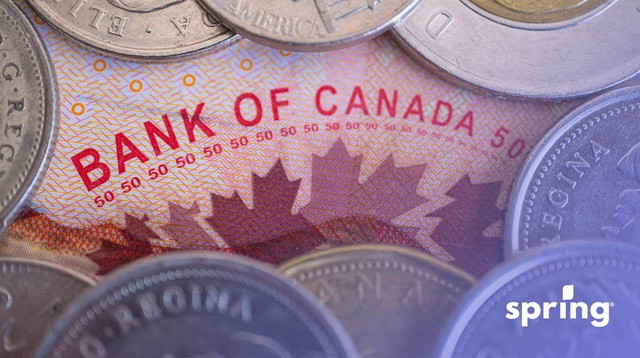Interest rate increases affect everyone a little bit differently but, whether you are borrowing or saving, they will affect you. Interest rates periodically change depending on Canada’s economy as well as many other factors. The Bank of Canada makes decisions regarding the benchmark interest rate by considering these factors.
How Does the Bank of Canada Influence Interest Rates?
The Bank of Canada is a financial institution and Crown corporation that is located in Ottawa. It’s also Canada’s central bank. They oversee banknotes and monetary policy. They set interest rates to help stabilize the Canadian dollar and help support the economy. The Bank of Canada is also the banker for the government. They manage the public debt program as well as foreign exchange reserves.
The way they influence inflation is by influencing demand in the economy. They don’t have much say when it comes to global commodities or supply chain issues, but it does have influence over borrowing costs. To do this, they change interests mostly by adjusting their policy rates. The policy rate is the short-term interest rate that decides how much banks pay for overnight loans. By adjusting the policy rate, they are influencing other interest rates in the economy.
Another way they can influence interest rates is by something that is known as quantitative easing (QE). This is done by communicating with financial markets and buying a large number of government bonds from investors.
The Bank of Canada meets every 8 weeks in order to make a decision regarding the interest rates. The federal government isn’t involved. The only time they are involved is every 5 years when the inflation control target is discussed.
What Causes the Bank of Canada to Raise Interest Rates?
The Bank of Canada has something called monetary policy. Monetary policy is broken into 2 parts, the inflation-control target, and the flexible exchange rate. The inflation-control rate portion of the monetary policy is part of their commitment to maintaining low and stable inflation. This means keeping inflation close to 2% of the 1% to 3% target percentage point. They use this target to help them decide on the policy interest rate also known as the target interest rate.
When inflation begins to rise too quickly, the Bank of Canada must do something to stop it from rising and even reduce it. By raising the interest rates, they can slow down borrowing and the purchasing of large items. This rate hike slowly starts to reduce the cost of things and can bring down inflation over time. Unfortunately, this isn’t an overnight process and can have some negative effects before the positives are seen. While this is helpful with large commodities like homes, it doesn’t affect the consumer price index too much when it comes to groceries or other small commodities.
What Happens When Interest Rates Rise?
The main thing that happens when interest rates rise is that the cost of borrowing increases. The most common ways this affects Canadians are through credit cards, mortgages, personal loans, and auto loans.
How Does the Bank of Canada Interest Rate Affect Mortgages?
The interest rates affect mortgages in multiple ways. When it comes to fixed rate mortgages, they only become affected when you renew. So, if you need to renew soon then it will make a difference. If you renew a few years down the road you may or may not be affected.
With a variable rate mortgage, your payments will increase when the prime rate increases. If you have locked in a variable interest rate, then your payments will stay the same with more of your money going towards interest instead of the principle.
Lastly, the higher interest rates also affect the ability of a first-time home buyer to get a mortgage. For a first-time buyer, chances are they are putting down less than 20% of the purchase price. Because of this, they are required to pass a stress test by federal law.
The stress test requires home buyers to prove they can make their mortgage payments based on the interest rate offered by their lender or the 5-year fixed term that was set by the Bank of Canada. The one that is higher will be used. When the interest rates are increased, this makes it more difficult for people to purchase a home.
How Does the Bank of Canada Interest Rate Affect the Prime Rate?
While each bank does set its own prime rate when it comes to lending money, the Bank of Canada’s policy interest rate does make a difference. Since the policy interest rates are what banks must pay the Bank of Canada to borrow money, they tend to fluctuate with the bank of Canada in order to offset these costs. These rates are known as overnight rates.
How Does the Bank of Canada Interest Rate Affect Borrowing Money?
As we discussed above, when the prime rates rise, financial institutions tend to follow to offset their borrowing losses. These prime rates affect the rates of all loans. If prime rises, the loan interest rates will rise/ This discourages borrowing, directly reflecting inflation.
How Does the Bank of Canada Interest Rate Affect Saving Money?
While rising interest rates don’t always affect savings accounts, it’s always a possibility. This may mean you get a small increase in your savings account or GICs (Guaranteed Investment Certificates). As interest rates continue to rise, you may see competitive pressure start to make more increases in the interest rates of these accounts.
What Can You Do to Prepare for Rising Interest Rates?
When it comes to preparing for interest rates to rise, there are plenty of things you can do to get yourself financially prepared.
- The first thing you can do is pay off or consolidate your high-interest debt. By putting this all into one monthly payment with one interest rate you are minimizing your payments, reducing the amount of interest you are paying, and giving yourself more money to put into other aspects of your life or even a high-interest savings account.
- As we discussed above, the rise in interest rates can increase your interest in your savings accounts. This makes it an ideal time to put your money into a high-interest account. You can continue saving your money but earn some interest on it as well.
- Another option is if you are close to coming to the time you need to renew your mortgage, do it as soon as you can. Depending on the type of mortgage you have and how much you have left owing, most of the time you can refinance your mortgage earlier than the 5-year mark. If you are taking this option, make sure to choose a fixed-rate mortgage. This will lock you in for 5 years and will make it so your mortgage is not affected by higher interest rates. Your mortgage broker or bank will be able to help you with this.
- Some people may also choose to buy a house before the interest rates rise. This of course depends on if you can afford it and if you find what you are looking for. This can be a great investment and much easier to do since the stress test won’t be anywhere near as difficult.
- A lot of people also tend to check in on their investments and make sure they are protected for the upcoming increase. Your financial advisor will be able to give you the best advice regarding this.
- It is also recommended to consider a home equity line of credit or loan versus a regular line of credit in order to get a reduced rate.
- Lastly, make a balanced budget. If you are balanced and can afford what you currently have then when interest rates rise it won’t be so difficult to afford any extra payments or larger monthly payments.
Even though interest rates make quite a difference in your financial situation, there are plenty of things you can do to help offset the impacts. Keeping a close eye on your money and paying attention to the Canadian economy is an important part of this. Just being able to make a few slight changes before the high-interest rates hit can make a large impact on your financial future.
Let Us Help You
While we aren’t able to help with all aspects that come with preparing for rising interest rates, we can make it easier by helping you consolidate any debt that you can’t afford to pay off right away. We specialize in personal loans that range anywhere from $500 to $35,000 that can be used to pay off any outstanding debt like credit cards or lines of credit.
With Spring Financial, you can apply in as little as 3 minutes and be approved in as quick as just a few hours. Because we also offer e-transfer, we can get that money to you as soon as a few hours after approval. Apply online or give us a call at 1-888-781-8439.








